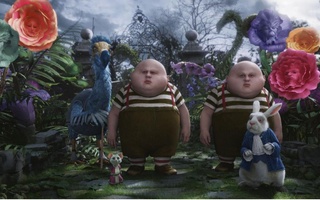Patrick Marber’s “Closer” is a play of extreme, if shallow, intensity. It features only four characters, each of whom is pitilessly revealed to be selfish, narcissistic, and hypocritical. In a setting as intimate as the Loeb Ex, “Closer”, which ran until April 27 and was directed by Lily R. Glimcher ‘14, had an almost suffocating effect. Although originally written as a play, “Closer” is perhaps best known to American audiences through Mike Nichols’ 2004 film version, which starred Julia Roberts and Natalie Portman ’03. More suited to stage than screen, it is nonetheless an excessively verbose play that explores its central themes with all the subtlety of an Ayn Rand novel and frequently resorts to melodrama. The deficiencies of the script were partially redeemed, however, by a resourceful and inventive production that transcended its minimalist set and by a remarkably mature and versatile performance by Max R. McGillivray ’16.
McGillivray plays Daniel Woolf, a self-described failed writer who writes obituaries for a newspaper. The play opens with Daniel in a doctor’s waiting room, where he has accompanied a stranger who he rescued from an accident. That stranger is Alice Ayres (Rachel A. Gibian ’15), a waitress and former stripper. At this point, Daniel is a socially awkward, insecure young man, disarmed by Alice’s confident sexuality. One year later, the action resumes—Daniel and Alice have been dating for a year, and Daniel is utterly transformed, now the author of a novel about Alice’s life. Chance encounters with two other characters—Anna (Georgina B. Parfitt ’13), a photographer who takes a picture of Daniel for the jacket of his book and Larry (Jacob A. Brandt ’14), the doctor from the opening scene—set up the rest of the action. Both Daniel and Larry fall for Anna, and her inability to decisively choose between the two is spun out into two hours of sexual drama.
The characters are obsessed, above all, with the nature of truth, but unlike other contemporary plays that share this concern, such as Michael Frayn’s “Copenhagen” or John Patrick Shanley’s “Doubt,” “Closer” has frustratingly little to say about its central subject. More interesting is the play’s exploration of the distinction between childhood and adulthood. Daniel abandons Alice, who loves him distractedly, for Anna ostensibly because Alice is a “child.” By the final scenes, however, Alice appears to be the most self-aware of the four, and Daniel the most childlike and emotionally needy. The script is pervaded by long, repetitive dialogue, and a love affair with profanity so torrid as to be almost absurd. One notable exception to this repetition if not the profanity was the hilarious scene in which Daniel, posing as Anna, has cyber sex with Larry in an online chat room. This was ingeniously staged with a screen in between the two characters in which the audience could see the chat, and marked [WC] the highlight of the production.
Daniel is by some distance the most complex character, and McGillivray played him with poise, whether he was a cad, a seducer, a nerd, or a rejected lover. He was most impressive and convincing when conveying Daniel’s vulnerability, one aspect of his character that was evident throughout the play. The role of Alice Ayres is arguably just as challenging—Gibian was most effective in the early scenes where she was cutesy and coquettish and in the second act where, clad in a corset and blue wig, she impressively pulled off a striptease act in a London club. But she never truly captured Alice’s emotional depth or managed to transcend the coquettish side of her persona in the dramatic scenes that called for greater emotional range. Parfitt, cast as Anna, the temptress, played her character in an unexpectedly aloof and disengaged manner, but she succeeded in delivering the script’s few moments of true comedy, such as her spot-on impression of an elderly aristocratic British stepmother. For much of the action, Brandt played Larry as a bluff, unemotional straight man, but he shone in a pivotal late scene that ended with him telling Anna to “fuck off and die!”
Marber’s script calls for minimalist set design and staging, and Glimcher followed this instruction in innovative ways. Parts of the set were rearranged to construct the play’s various environments. Most impressive was the seamless switch from strip club to café with the sole addition of a small table. Other prop decisions such as the use of photo frames as gravestones were less convincing. Overall, Glimcher and her team approached the script with ingenuity in the staging, an impressive feat given the emotional limitations of the source material.
—Staff writer Keshava D. Guha can be reached at kdguha@fas.harvard.edu.
Read more in Arts
15 Hottest... Portraits!Recommended Articles
-
Vanderbilt University.The new term opened February 1. A series of lectures on economic and constitutional history has been begun by E.
-
OBITUARY.Dr. Daniel Denison Slade of the class of '44 died yesterday morning at his home in Newton. Dr. Slade was
-
University CalendarThursday, April 14. *MORNING PRAYERS. Rev. Dr. Francis John McConnell. Appleton Chapel, 8.45 A. M. *ZOOLOGICAL CLUB. Problems of Research
-
Phi Beta Kappa RepresentativesThe Phi Beta Kappa Chapter of the University will be represented at the annual dinners of Dartmouth and of Yale.
-
Film ReviewsOvernight Directed by Tony Montana and Mark Brian Smith ThinkFilm Inc. Everyone loves a “rags to riches” tale. But what
-
 Alice in Wonderland
Alice in Wonderland













